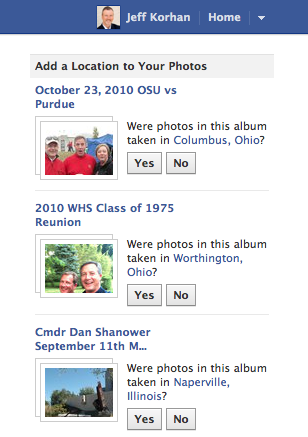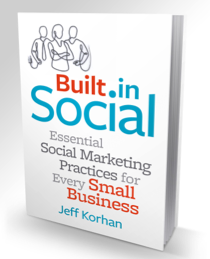
Facebook Timeline is much more than an improved interface for enhancing the user experience.
The magazine style format of Facebook Timeline promises to change how Facebook is used – by creating greater awareness that every user is indeed an online publisher.
When one assumes the role of a publisher, as opposed to that of a casual networker, the quality and nature of what is shared is likely to change – and for the better.
The percentage of Facebook users that have activated Timeline is still quite low for a number of reasons, including resistance to yet another change – and the uncertainties associated with making it.
This article will provide you with the resources to successfully make the transition to Timeline – quickly and easily.
You will discover the Timeline format helps you to better edit and update your information. It also works to get and keep you organized – while also building deeper and more sustainable relationships.
We are witnessing the beginning of an all out effort by the major social networks to earn your attention and time, while also giving you more control over what you publish on Facebook, as well as capabilities for editing or deleting historical content.
Timeline is People Magazine for Real People
The success of People Magazine is driven by the fact people are interested in people – their stories, pictures from their lives, and commentary and editorial content about all of it.
The content in People Magazine is predominantly concerned with the lives of celebrities because that is what sells magazines. You and I are more interested in the happenings of our friends.
The friends in our lives are regular people that also lead interesting lives – and that is what is being published on Facebook.
Unfortunately, the Facebook newsfeed does not allow us to interact with them as we do in real life.
For one thing, Facebook filters our experience. Additionally, there is often so much noise that we find ourselves tuning out.
Timeline actually gives you the capabilities for creating an improved experience – as they should if they expect you to spend more time on Facebook.
Timeline and Your Social Graph
One essential ingredient for improving your Facebook experience with Timeline is an understanding of social graphs.
Your Facebook social graph is a digital description of you that is based upon the information in your personal profile, all of your friends and how you are aligned with them, and everything that is shared among them.
You will notice that Timeline asks a lot of questions. When you give both honest and accurate answers, you help Facebook to create a more accurate social graph that is used to give you an experience that is more honest and true to life.
The screenshot below is one example where Facebook is seeking information so that they can build a more accurate social graph – one that better connects and aligns me with my true friends, especially by location.

Alignment within Facebook, and all of the social networks, is not just about friends. Greater alignment via more descriptive social graphs creates more possibilities for new business opportunities – as a result of location, shared relationships, and more.
The key is providing honest and accurate information.
5 Steps for Transitioning to Timeline
#1 – Watch Tutorial Videos
Grovo is an an educational site with thousands of short training videos that will help you to quickly ramp up your technology capabilities. They have created an especially helpful series dedicated to transitioning to Timeline.
It will take you less than an hour to watch the entire Grovo Timeline series. Set aside the necessary time, take good notes, and you will be good to go.
#2 – Preview Timeline for 7 Days
Facebook has their own video for Timeline, one that is mostly a general overview. At the bottom of that page is the link for agreeing to take the 7 day tour.
Be advised – there is no turning back. Once you agree to the tour, you will have to make the transition within those 7 days.
While previewing Timeline you will discover your Facebook profile is now your Facebook Timeline. This is what you see. Your friends still see you normal profile.
Nevertheless, you can still interact with your friends from your Timeline, even while previewing it. This is where you will begin to discover some of its advantages.
For example, recent conversations are now front and center – giving you the opportunity to continue those conversations if you desire. This is arguably one of the clear benefits of Timeline – one that helps you to develop deeper and more sustainable relationships.
#3 – Choose an Appropriate Cover Photo
The sheer size of the banner or cover photo at the top of your Timeline is undeniably something that speaks to who you are. So, make it a good one. Choose a photo with good resolution.
My preliminary observation is that sunsets and other nature scenes are most popular. Whatever you choose, it is helpful to know the limitations of this photo are 850 x 315 pixels.
Most important is the 850 pixel width. If you load up a larger photo, Facebook will allow you to adjust its vertical dimensions to capture just the right frame.
#4 – Update, Hide, or Delete Unnecessary Content
Updating your family relationships, bio, and things of that nature are much easier within Timeline. If you expect this information to be serve you well, my suggestion is to seek clarity and brevity.
Unless you have published content that is potentially damaging, you will want to hide it – as opposed to deleting it.
Here’s why.
When you hide content you are communicating to Facebook that it is still relevant to your social graph. For example, I published quite a few videos related to small business marketing that are not up to my current standards.
By simply hiding them, I am sending Google a message that they are still relevant – that my business is still focused on helping small businesses. Nobody will ever see them, but the key words and such still help to create alignment for future business opportunities.
#5 – Publish Your Magazine
Nothing productive happens without taking action. You have to publish to effectively nurture and expand your network relationships.
The freer you are with sharing, the more likely you will encourage conversations and accomplish your networking objectives – regardless of whether they are personal or professional.
After all, remember you can always update, hide, or delete virtually anything you publish.
Even People Magazine cannot do that!
So, what are you waiting for?
Leave a comment below or share this with your community with any of the share buttons below – or with those on the little red bar at the bottom of this page.
Until next time, Jeff


